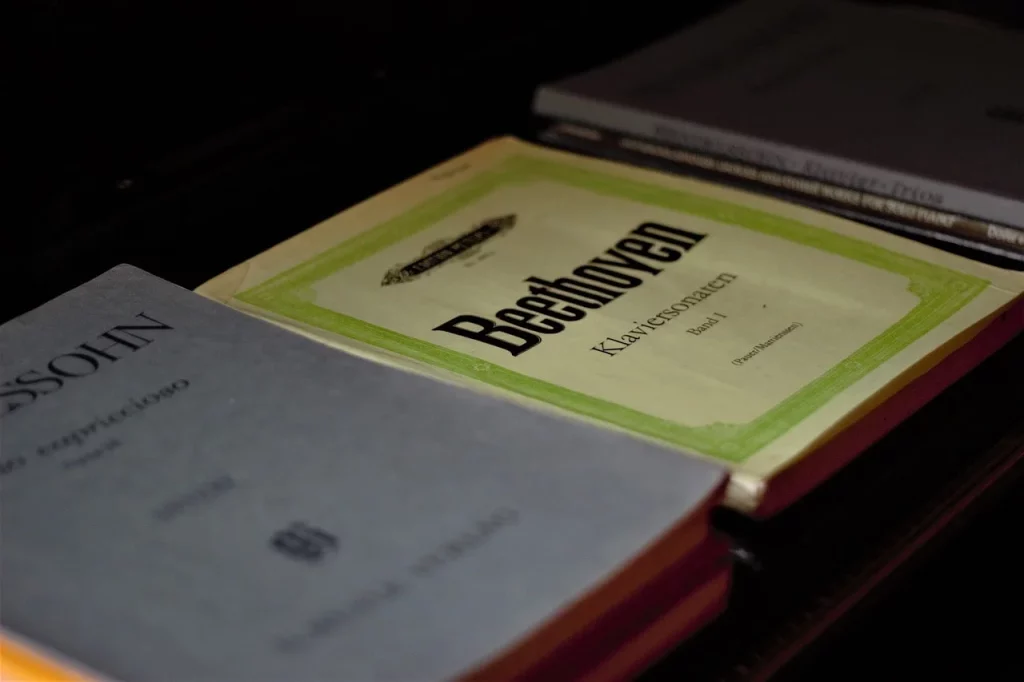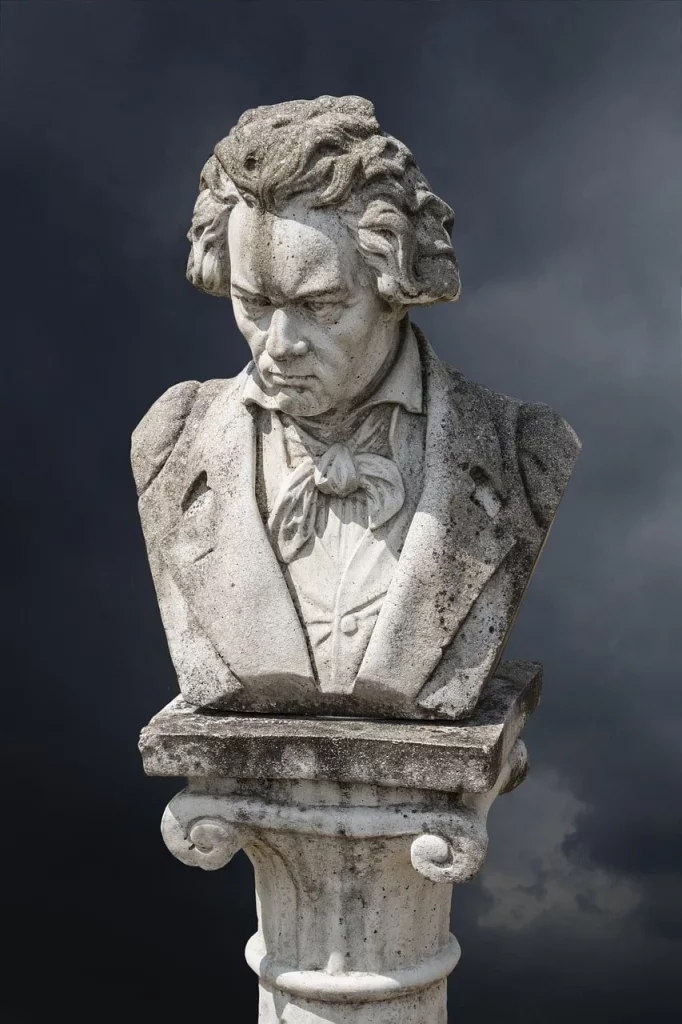Beethoven once said, ‘Music is a higher revelation than all wisdom and philosophy.’ True to his word, he gave us music that transcends time, touching souls and stirring emotions centuries after his death.
But did you know he also had a wicked sense of humor? Once, he played a trick on his audience by pretending to play a new composition, but in reality, he was just moving his fingers over the keyboard without pressing any keys!
Beyond his playful side, Beethoven’s life was a roller coaster of triumphs and challenges. Are you curious to learn more about the extraordinary life of this musical titan?
Beethoven can write music, thank God, but he can do nothing else on earth.
Ludwig van Beethoven
Beethoven Facts
Let’s dive deep into the world of Ludwig van Beethoven. Keep your eyes peeled for details, because I created a quiz for you at the end of this article to test your knowledge. Don’t disappoint me.
- Despite losing his hearing, he continued to compose, conduct, and perform music, demonstrating unparalleled resilience and creativity in the face of adversity.
- He was not born into a wealthy family; his early life was marked by struggle and a demanding father who recognized his musical talents early on.
- His “Eroica” Symphony was originally dedicated to Napoleon Bonaparte, whom he admired as a symbol of freedom and democracy, but he furiously revoked the dedication upon learning of Napoleon declaring himself Emperor.
- The famous opening motif of Symphony No. 5 is often interpreted as “fate knocking at the door,” showcasing his ability to convey profound concepts through music.
- He moved to Vienna intending to study with Mozart, but circumstances prevented this from happening; he instead studied with Joseph Haydn.
- Despite his profound deafness, he was able to compose his late masterpieces by hearing the music in his head, a testament to his internal musical genius.
- His Ninth Symphony was groundbreaking, being one of the first examples of a major composer using voices in a symphony, thus blurring the lines between symphony and opera.
- The “Moonlight Sonata” was not named by him but by a music critic who remarked that the first movement evoked the feeling of moonlight shining upon Lake Lucerne.
- In an era when most musicians relied on commissions from the aristocracy, he was one of the first to achieve financial independence through concerts and the publication of his works.
- His Heiligenstadt Testament, a letter never sent to his brothers, reveals his despair over his increasing deafness and his resolve to overcome his condition.
- A passionate coffee lover, he was meticulous about his coffee, counting out 60 beans per cup.
- Despite his towering figure in classical music, he struggled with personal relationships and never married, though he came close several times.
- His Pastoral Symphony reflects his deep love for nature, serving as one of the earliest and most profound musical expressions of this sentiment.

- He once stopped a performance of his Third Symphony because he noticed a mistake in the playing, showcasing his uncompromising demand for precision.
- The composer’s last words were reportedly “Plaudite, amici, comedia finita est” (Applaud, my friends, the comedy is over), though this account varies.
- He was a pioneer in the development of the symphonic form, expanding the scope and complexity of his compositions beyond the conventions of his time.
- His only opera, “Fidelio,” went through numerous revisions and was initially a failure, only gaining recognition after his death.
- The Immortal Beloved letters reveal a deeply passionate and tumultuous side to his personality, yet the identity of the woman remains a mystery.
- He had a contentious relationship with his nephew Karl, whom he attempted to mold in his own image, leading to a tragic and strained relationship.
- His influence extends beyond classical music; he has been cited as an inspiration by numerous rock, pop, and film composers throughout history.
- A meticulous worker, he left behind numerous sketchbooks that provide insight into his compositional process and the development of his musical ideas.
- His funeral was attended by thousands, indicating the immense impact he had on Vienna’s public and the recognition of his genius during his lifetime.
- Contrary to popular belief, there is no concrete evidence that he was black; this myth stems from misinterpretations and exaggerations of historical descriptions.
- The “Diabelli Variations” stand as one of the supreme achievements in the field of variation form, showcasing his ability to transform a simple theme into a complex, multifaceted masterpiece.
- Despite his critical role in the transition from the classical to the romantic era in music, he considered himself a craftsman, diligently honing his craft.
- He had a profound influence on subsequent generations, with composers like Brahms, Wagner, and Mahler seeing him as a pivotal figure in music history.
- His struggle with hearing loss began in his late 20s, a devastating development for a musician, yet it did not deter his musical output.
- His “Missa Solemnis” is considered one of the most significant Mass settings, yet it was not performed in its entirety during his lifetime.

- A lover of literature, his music was influenced by the works of Goethe and Schiller, with the “Ode to Joy” in his Ninth Symphony being a direct reference to Schiller’s poem.
- He was known for his unruly hair and distinctive look, often depicted in portraits and busts that emphasize his intense gaze.
- Despite his fame, he lived in nearly 40 different residences throughout Vienna, indicative of his restless nature and possibly his search for a quiet place to compose.
- His string quartets, particularly the late quartets, are revered for their emotional depth and structural innovation, pushing the boundaries of the genre.
- The discovery of his hearing condition led him to consider suicide, but his dedication to music kept him from ending his life, according to the Heiligenstadt Testament.
- He occasionally engaged in public piano battles, a popular form of entertainment, showcasing not just his compositional talent but also his prowess as a pianist.
- His works, particularly the symphonies, are considered cornerstones of the Western classical repertoire, frequently performed and recorded.
- Despite his deteriorating health, his creativity in his final years resulted in some of his most profound works, including the Ninth Symphony and the late string quartets.
- He was somewhat of a celebrity in Vienna, known for his temperamental personality and frequent conflicts with patrons, yet revered for his musical genius.
- His extensive use of cyclic form, where themes or motifs recur throughout a single piece or across multiple works, was innovative and influenced future composers.

- The dedication of his works to his patrons, including aristocrats and influential figures, was a common practice, though he often had strained relationships with them.
- His piano sonatas, often called the “New Testament” of piano music, expanded the technical and expressive capabilities of the instrument.
- Despite the profound sadness and challenges in his personal life, his music often conveys a sense of triumph over adversity, resonating with audiences for centuries.
- He was buried in a grave marked by a monument that the Ludwig van Beethoven Society erected, which has become a site of pilgrimage for music lovers worldwide.
- His influence on the development of the piano was significant, with his compositions pushing the instrument to its limits and contributing to its evolution.
- He had a complex relationship with his contemporaries; he was admired by many as a genius but also regarded as difficult and eccentric.
- The breadth of his compositions across various musical forms—symphonies, sonatas, quartets, operas, and more—demonstrates his versatility and mastery.
- His habit of walking in the countryside for inspiration is well-documented, with many of his ideas for compositions coming during these strolls.
- Despite being recognized as one of the greatest composers of all time, his life was marked by loneliness, health issues, and unrequited love, adding a poignant layer to his legacy.
- His intense dedication to his craft often led him to work on several compositions simultaneously, a testament to his prodigious work ethic and creative mind.
- He was known to immerse his head in cold water before composing, believing it stimulated his creativity and helped him think more clearly.
- The “Choral Fantasy”, considered a precursor to the Ninth Symphony, combines piano, chorus, and orchestra in a manner that foreshadowed his later groundbreaking integration of vocal and symphonic elements.
Beethoven Myths

So you’ve delved into the fascinating life and works of Beethoven. But did you know that alongside the well-established truths lie intriguing myths and misconceptions? Let’s separate fact from fiction and explore the lesser-known legends surrounding the musical titan.
- Beethoven Was Deaf From Birth
He was not born deaf; his hearing loss began in his late 20s. It is widely believed that by his late 40s, he was almost completely deaf. Despite this significant challenge, his passion for music was undeterred, leading to the creation of some of his most famous compositions during this time. - Beethoven Was Always Grumpy and Unfriendly
It is often thought that he had a perpetually grumpy demeanor. However, letters and accounts from his contemporaries suggest that, while he could be difficult, he also had periods of joy and kindness. His moodiness was likely exacerbated by his deafness and health issues. - Beethoven’s “Elise” Was Written for a Lover
The true identity of “Elise,” for whom the famous “Für Elise” was supposedly composed, remains a mystery. Some scholars suggest that the piece might have been dedicated to Therese Malfatti, a friend and student of Beethoven’s, but errors in transcription could have led to the name “Elise.” - Beethoven Was of African Descent
The theory that he had African ancestry stems from his dark complexion and features described by some contemporaries. However, research into his lineage indicates European ancestry, with no concrete evidence supporting African heritage. This myth reflects the complexities of racial identity and historical speculation. - Beethoven Was Poisoned by Lead
While high levels of lead were found in Beethoven’s hair, suggesting chronic lead exposure, it is not conclusively proven that lead poisoning was the cause of his death. The exact cause remains uncertain, with liver disease being a more likely culprit, possibly exacerbated by alcohol consumption.
No products found.
Beethoven Quotes

Let’s dive into the minds of those who knew Beethoven best or were deeply affected by his music. These quotes unlock insights into his genius, impact, and the enduring power of his creations.
Beethoven always sounds to me like the upsetting of bags of nails, with here and there an also dropped hammer.
John Ruskin
John Ruskin vividly expresses his perplexity and discomfort with Beethoven’s compositions, likening them to chaotic noise rather than structured music.
Music is the mediator between the spiritual and the sensual life. Beethoven exerted a powerful influence on me.
Ludwig van Beethoven
Beethoven articulates his profound belief in music as a bridge between the tangible and intangible, revealing the depth of his artistic philosophy.
Beethoven is the greatest composer who ever lived. I would uncover my head and kneel before his tomb.
Franz Liszt
Franz Liszt pays homage to Beethoven, acknowledging his unparalleled genius and expressing deep reverence for his predecessor’s monumental legacy.
When I open my eyes I must sigh, for what I see is contrary to my religion, and I must despise the world which does not know that music is a higher revelation than all wisdom and philosophy.
Ludwig van Beethoven
Beethoven reflects on his disappointment with the world’s inability to recognize music’s transcendent power, underscoring his devotion to the art form.
To play a wrong note is insignificant; to play without passion is inexcusable.
Ludwig van Beethoven
Beethoven emphasizes the importance of emotional expression over technical perfection in music, advocating for passion as the essence of true artistry.
Beethoven FAQ

Before you turn the page for the quiz, absorb these frequently asked questions. Read carefully if you want to succeed.
- Where was Beethoven born?
He was born in the lovely city of Bonn, which is now in modern-day Germany, on December 16, 1770. It’s a place rich in musical history, partly thanks to him! - How did Beethoven become deaf?
His hearing loss began in his late 20s, and it’s believed to have been caused by a combination of genetic factors, abdominal ailments, and possibly lead poisoning. Despite this challenge, he continued to compose, performing an incredible feat by creating some of his most important works while completely deaf. - What are Beethoven’s most famous compositions?
His music library is vast, but his most celebrated pieces include Symphony No. 5 with its iconic “da-da-da-daaa,” the hauntingly beautiful “Moonlight Sonata,” the joyous “Ode to Joy” from Symphony No. 9, and the dramatic “Für Elise.” Each piece offers a glimpse into his genius and emotional depth. - When did Beethoven pass away?
The great composer left us on March 26, 1827, in Vienna, Austria. His legacy, however, has never faded, continuing to inspire and move people all around the world. - Did Beethoven ever marry?
No, he never married. Though he had several close relationships and was even engaged once, his personal life remained complicated and mostly centered around his music and family responsibilities.
No products found.
Beethoven Trivia

Welcome to our Beethoven quiz, where the only thing more dramatic than a missed note in Symphony No. 5 is what happens if you score zero. Hint: It may involve conducting an orchestra of howling cats at midnight.
Conclusion
As we draw the curtain on his life and legacy, we’re reminded of the undying echo of his music, resonating through the corridors of time. Beethoven, a colossus straddling the realms of classical and romantic music, battled personal adversities to gift the world with compositions that speak directly to the soul.
His journey, marked by relentless innovation and a quest for perfection, underscores the power of human resilience and creativity. From the tempestuous depths of the ‘Moonlight Sonata‘ to the triumphant heights of the Ninth Symphony, Beethoven’s work invites us to explore the full spectrum of human emotion.
So, as you hum your favorite melody, remember the man who, deaf to the world, composed symphonies that the world would never cease to hear. Till next time, stay curious. Cheers.


